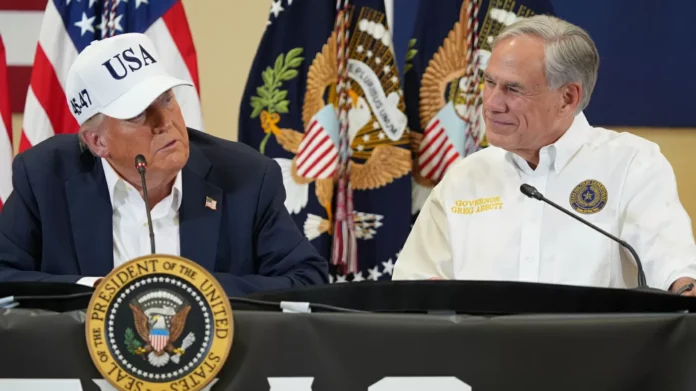In the wake of the devastating floods in Texas, rhetoric from the Trump administration officials seems to be shifting towards reforming the Federal Emergency Management Agency (FEMA) rather than completely axing it. This subtle change in tone is a welcome shift, especially in the face of mounting questions about the disaster agency’s effectiveness. It shows a willingness to address the flaws in the system and work towards improving it for the benefit of all Americans.
FEMA, an agency created in 1979, has been tasked with coordinating the government’s response to natural disasters and emergencies. However, over the years, FEMA has faced criticism for its slow response time, mismanagement of funds, and lack of preparedness for disasters. These issues have come to the forefront once again, as the nation grapples with the aftermath of Hurricane Harvey in Texas.
In the past, the Trump administration had proposed cutting FEMA’s budget by $667 million, which would have severely impacted the agency’s ability to respond to disasters. However, in light of the recent floods in Texas, there has been a noticeable shift in rhetoric from key figures within the administration. Instead of advocating for the complete dismantling of FEMA, there is now a focus on reforming the agency to make it more effective and efficient.
One of the key figures leading this change in rhetoric is the newly appointed FEMA administrator, Brock Long. In an interview with CNN, Long stated, “We need to reform FEMA to make it more responsive, efficient, and effective.” He also stressed the importance of addressing the funding issues faced by the agency, stating that “FEMA needs to be adequately funded to fulfill its mission of helping Americans during times of crisis.”
This change in tone has been echoed by other administration officials as well. White House press secretary Sarah Huckabee Sanders stated that the administration is committed to working closely with FEMA to ensure that it is well-equipped to handle disasters. She also highlighted the importance of streamlining the agency’s processes and procedures to improve its response time.
This shift in rhetoric is a positive step towards addressing the long-standing issues with FEMA. It shows a willingness on the part of the administration to listen to the concerns of the American people and take action to improve the agency. It also reflects a recognition of the crucial role that FEMA plays in disaster response and the need to strengthen it rather than dismantle it.
Furthermore, this change in rhetoric is a testament to the administration’s commitment to putting the needs of the American people first. In times of crisis, it is essential to have a well-functioning agency that can provide timely and effective assistance to those in need. By acknowledging the need for reform within FEMA, the administration is showing that it is willing to do whatever it takes to ensure the safety and well-being of its citizens.
While it is still early days, and actions speak louder than words, this shift in rhetoric is a promising sign for the future of FEMA. It is a clear indication that the administration is taking the concerns of the American people seriously and is committed to working towards a more efficient and effective disaster response system.
In conclusion, the rhetoric from the Trump administration officials regarding FEMA has shifted towards reform rather than complete elimination. This change in tone is a positive step towards addressing the long-standing issues with the agency and improving its effectiveness. By working towards strengthening FEMA, the administration is showing a commitment to the well-being of its citizens and a willingness to listen to their concerns. Let us hope that this shift in rhetoric translates into concrete actions that will make FEMA a more efficient and reliable agency for years to come.

